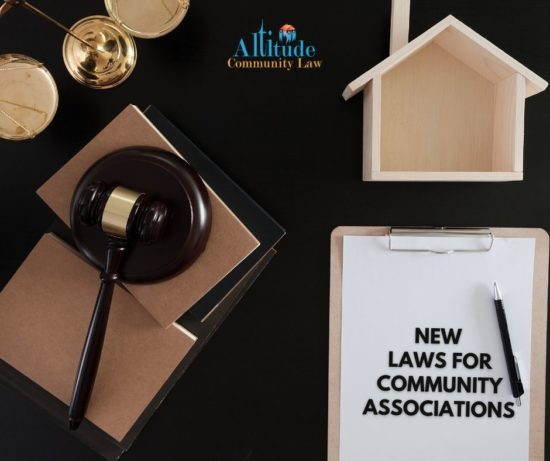
It was a busy year for the Colorado Legislature. Community associations were the subject of much debate and multiple bills. Two of the most important bills for community associations included House Bill 21-1310 and House Bill 21-1229. These new laws amend various provisions within the Colorado Common Interest Ownership Act (CCIOA) and concern the regulation of signs, flags, artificial turf, solar panels, and corporate records. These laws go into effect in September and impact virtually all community associations in the State of Colorado.
Homeowner Freedom of Expression (HB 21-1310)
The existing provisions of CCIOA concerning American flags, service flags, and political signs have been completely revised and overhauled by HB 21-1310. The new law provides homeowners with broad discretion as to the types of flags and signs they may display. More specifically:
Flags
- The language in CCIOA protecting the display of American flags and military service flags has been removed and replaced.
- The new language protects the display of virtually any type of flag on an owner’s property, in a window of a unit, or on a balcony adjoining the unit.
- An association may not prohibit or regulate the display of flags on the basis of their subject matter, message, or content, with the exception of flags bearing commercial messages.
- Associations may adopt reasonable, content-neutral rules to regulate the number, location, and size of flags and flagpoles but may not prohibit the installation of flags or flagpoles.
Signs
- The language in CCIOA protecting the display of political signs has been removed and replaced.
- The new language protects the display of virtually any sign on an owner’s property and in the window of a unit.
- An association may not prohibit or regulate the display of signs on the basis of their subject matter, message, or content, with the exception of signs bearing commercial messages.
- Associations may adopt reasonable, content-neutral rules to regulate the number, placement, and size of signs. The Association may also adopt rules regulating signs based upon other “objective factors.”
Homeowner Governance Protections (HB 21-1229)
What started as an extensive overhaul and amendments to CCIOA was ultimately narrowed to a few key issues. The new law provides protection for artificial turf, clarity for permissible solar panel regulations, and additional transparency as to association records. More specifically:
Artificial Turf
- The changes declare any section of the covenants, bylaws, or rules and regulations that prohibit the use of nonvegetative turf grass (artificial turf) in the backyard of a residential property as contrary to public policy and unenforceable.
- Allows an association to adopt and enforce design and aesthetic guidelines and rules that apply to nonvegetative turf grass to regulate the type, number, and placement of drought-tolerant plantings and hardscapes that may be installed and to restrict the installation of nonvegetative turf grass to rear yards only.
Solar Panels
- Clarifies that although an association must generally allow the installation of solar panels on the owned property, an association can impose reasonable aesthetic rules regulating the dimension, placement, and external appearance of the solar panels so long as the rules do not increase the cost by more than 10% or decrease the performance or efficiency of the device by more than 10%.
- Requires applications for approval for the installation of solar panels submitted to an association to be approved, denied, or returned for modification within 60 days and the basis for any denial to be described in reasonable detail.
Association Records
- Associations must now produce and disclose all unique and extraordinary fees, assessments, and expenses that are chargeable by the Association in connection with the purchase or sale of a unit and not paid through assessments such as transfer fees, record change fees, and charges for a status letter.
- The changes clarify that association inspection charges may include the actual cost of production, reproduction, including the cost of copying, mailing, and any necessary special processing.
- Establishes monetary penalties in the event an association fails to produce required documents within 30 days of receipt of a request and payment of any required fees. Penalties are backdated to the 11th day after receipt of the request.
In light of these new laws, all community associations should review their existing rules, policies, and design guidelines pertaining to signs, flags, artificial turf, solar panels, and community records. Associations may need to update and revise their existing documents and/or prepare new policies to comply with the new laws. If you have questions or would like to discuss services offered by Altitude Community law, please contact us at 303.432.9999.